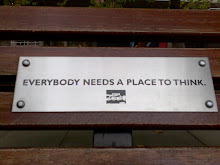
I've just finished reading an excellent book - Flowers for Algernon by Daniel Keyes. Thoroughly recommend it.
Here's an interesting quote before the novel begins:
Any one who has common sense will remember that the bewilderment of the eyes are of two kinds, and arise from two causes. Either from coming out of the light or from going into the light, which is true of the mind's eye, quite as much as of the bodily eye. And he who remembers this when he sees any one whose vision is perplexed and weak will not be too ready to laugh. He will first ask whether that soul of man has come out of the brighter life, and is unable to see because unaccustomed to the dark, or having turned from darkness to the day is dazzled by excess of light. And he will count the one happy in his condition and state of being, and he will pity the other. Or, if have a mind to laugh at the soul which comes from below into the light, there will be more reason in this than in the laugh which greets him who returns from above out of the light into the den.
Plato, The Republic
The style of writing mirrors the intellectual development of a young man Charlie who volunteers to be the first human subject of a science experiment which was aimed to smarten him up. The scientists believed that their experiment will work following trials on Algernon, a mouse. Their method of testing success of increased intellect was to get Algernon to navigate mazes of increasing complexity, which he did succeed in doing. It was a simplistic assumption made by the scientists that the complexity of mazes could reflect the complexity of life...

Written from Charlie's perspective, we enter his simple endearing world and journey through his mental maze of anguish and perplexity as his IQ accelerates so rapidly that his emotional development could not keep up.
It's a dazzling process with a grey ending. With a capacity to think and feel at levels of complexity, one can't not invite the possibility of dwelling, of interpretation and of sense-making. Can we?
I think about the athletes whom I used to work with in Special Olympics. Maybe they are the lucky ones to view life and experience the world through unique, simplistic eyes.





























